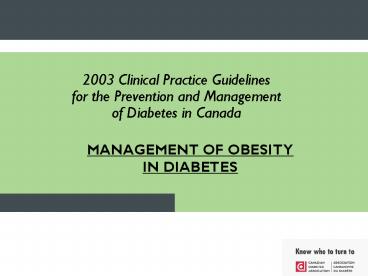MANAGEMENT OF OBESITY IN DIABETES - PowerPoint PPT Presentation
1 / 13
Title:
MANAGEMENT OF OBESITY IN DIABETES
Description:
2003 Clinical Practice Guidelines for the Prevention and Management of Diabetes in Canada MANAGEMENT OF OBESITY IN DIABETES OBESITY An estimated 80 to 90% of persons ... – PowerPoint PPT presentation
Number of Views:294
Avg rating:3.0/5.0
Title: MANAGEMENT OF OBESITY IN DIABETES
1
MANAGEMENT OF OBESITYIN DIABETES
- 2003 Clinical Practice Guidelines
- for the Prevention and Management
- of Diabetes in Canada
2
OBESITY
- An estimated 80 to 90 of persons with type 2
diabetes are overweight. - Weight loss improves glycemic control by
increasing insulin sensitivity and glucose uptake
and diminishing hepatic glucose output.
3
OBESITY
- The initial assessment of people with diabetes
should include height and weight measurements
(and calculation of body mass index) and waist
circumference to assess the degree of abdominal
fat. - Waist circumference values ? 102 cm in men and ?
88 cm in women are associated with substantially
increased abdominal fat accumulation and health
risks.
4
BODY MASS INDEX
Classification Body Mass Index (kg/m2) Risk of developing health problems
Underweight lt 18.5 Increased
Normal weight 18.5 - 24.9 Least
Overweight 25 - 29.9 Increased
Obese Class I Class II Class III ? 30 30 - 34.9 35 - 39.9 ? 40 High Very high Extremely high
BMI values are age and gender independent, and
may not be correct for all ethnic populations.
5
TREATMENT GOALS
- Reduce body fat.
- Attain maintain a healthy body weight for the
long term. - Prevent weight gain.
6
TREATMENT
- A modest weight loss of 5 to 10 of initial body
weight can substantially improve insulin
sensitivity and glycemic control, high blood
pressure and dyslipidemia. - Lifestyle interventions that combine dietary
modification, increased and regular physical
activity and behaviour therapy are the most
effective. - All weight-loss diets must be well balanced and
nutritionally adequate.
7
PHARMACOTHERAPY
- Pharmacotherapy for overweight people with
diabetes can improve glycemic control and result
in a reduction in the dosages of
antihyperglycemic medications. - Pharmacotherapy is an acceptable adjunct in the
short and long-term management of obesity when
lifestyle measures fail after an adequate trial
of 3 to 6 months.
8
ANTI-OBESITY DRUGS
Class Generic Name Trade Name Action
Noradrenergic and serotoninergic reuptake inhibitor sibutramine Meridia Enhances satiety and decreases hunger
Gastrointestinal lipase inhibitor orlistat Xenical Reduces dietary fat absorption nonsystematic
9
SURGERY
- Surgery can be considered for carefully selected
patients after evaluation by an interdisciplinary
team. Surgery is usually reserved for people with
class III (or class II, with comorbidities)
obesity. - The Roux-en-Y gastric bypass appears to be the
most successful and preferred procedure.
10
OBESITY- RECOMMENDATIONS
- An interdisciplinary program of lifestyle
modification, including regular physical activity
or exercise and calorie reduction, should be
implemented to promote long-term weight loss,
weight maintenance and prevention of weight gain
Grade D, Consensus.
11
OBESITY- RECOMMENDATIONS
- A weight-loss goal of 5 to 10 of initial body
weight over a 6-month period should be
recommended to improve overall metabolic and
glycemic control in obese people with type 2
diabetes Grade C, Level 3. - The recommended energy deficit should be
approximately 500 kcal/day, which can lead to an
expected weight loss of 1 to 2 kg/month (2 to 4
lbs/month) Grade D, Consensus.
12
OBESITY- RECOMMENDATIONS
- In obese people with type 2 diabetes, medical
therapy with the antiobesity agent orlistat
(gastrointestinal lipase inhibitor) Grade A,
Level 1A or sibutramine (norepinephrine and
serotonin reuptake inhibitor) Grade B, Level 2
may be considered as an adjunct to lifestyle
modification to expedite achievement of
weight-loss goals and weight maintenance.
13
OBESITY- RECOMMENDATIONS
- For individuals with class III obesity (BMI ?
40.0 kg/m2) or class II obesity (BMI 35.0 to
39.9 kg/m2) with comorbidities who are unable to
achieve weight-loss goals following an adequate
trial of lifestyle intervention, bariatric
surgery may be considered to reduce metabolic
comorbidities Grade C, Level 3.

